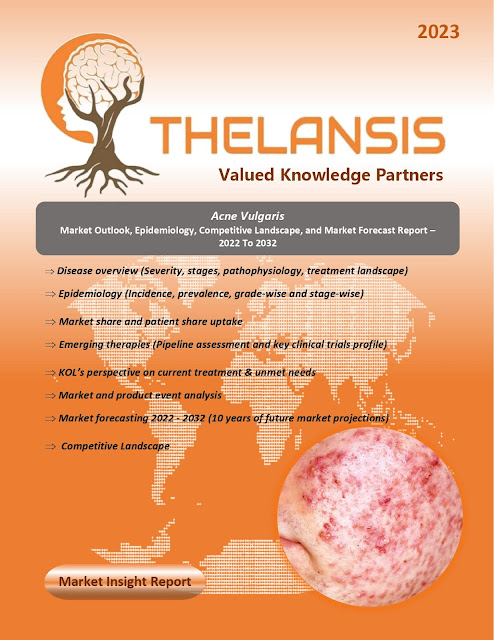Alström Syndrome (AS) – Market Outlook, Epidemiology, Competitive Landscape, and Market Forecast Report – 2024 To 2034
Alström Syndrome (AS) Market Outlook
Thelansis’s “Alström Syndrome (AS)
Market Outlook, Epidemiology, Competitive Landscape, and Market Forecast Report
– 2024 To 2034" covers disease overview, epidemiology, drug utilization,
prescription share analysis, competitive landscape, clinical practice,
regulatory landscape, patient share, market uptake, market forecast, and key
market insights under the potential Alström Syndrome (AS) treatment modalities options for eight major
markets (USA, Germany, France, Italy, Spain, UK, Japan, and China).
Alström
Syndrome (AS) Overview
Alström
Syndrome (AS) is an ultra-rare multisystem genetic disorder caused by
pathogenic variants of the ALMS1 gene. The disease is relentlessly progressive
in nature which can result in premature death. Misdiagnosis is common. Because
so many features of Alström Syndrome develop as children get older, more than
seventy percent of the known Alström Syndrome patients have received previous
misdiagnoses, and almost half of these have received multiple misdiagnoses. It
progresses to severe visual impairment by the end of the second decade in 75%.
Obesity develops in early childhood. Progressive bilateral sensorineural
hearing loss is more variable, often presenting with high-frequency loss in the
first decade but not detectable until much later in the minority. More than 60%
of individuals with AS develop cardiomyopathy. This can present as potentially
reversible dilated cardiomyopathy in infancy or presenting de novo or
recurrence in adolescence with progression to a restrictive pattern. Insulin
resistance is present from infancy- and progression to glucose intolerance is
partly related to the degree of obesity. Molecular genetic testing of ALMS1,
the only gene in which mutations are known to cause Alström syndrome, is
estimated to detect mutations in 70%-80% of individuals of northern European
descent and approximately 40% worldwide.
Geography
coverage:
G8 (United States,
EU5 [France, Germany, Italy, Spain, U.K.], Japan, and China)
Insights driven
by robust research, including:
- In-depth interviews with leading
KOLs and payers
- Physician surveys
- RWE analysis for claims and EHR
datasets
- Secondary research (e.g.,
peer-reviewed journal articles, third-party research databases)
Deliverables
format and updates*:
- Detailed Report (PDF)
- Market Forecast Model (MS
Excel-based automated dashboard)
- Epidemiology (MS Excel; interactive
tool)
- Executive Insights (PowerPoint
presentation)
- Others: regular updates,
customizations, consultant support
*As per
Thelansis’s policy, we ensure that we include all the recent updates before
releasing the report content and market model.
Salient
features of Market Forecast model:
- 10-year market forecast (2024–2034)
- Bottom-up patient-based market
forecasts validated through the top-down sales methodology
- Covers clinically and
commercially-relevant patient populations/ line of therapies
- Annualized drug-level sales and
patient share projections
- Utilizes our proprietary Epilansis and Analog tool
(e.g., drug uptake and erosion) datasets and conjoint analysis approach
- Detailed methodology/sources
& assumptions
- Graphical and tabular outputs
- Users can customize the model based
on requirements
Key business
questions answered:
- How can drug development and
lifecycle management strategies be optimized across G8 markets (US, EU5,
Japan, and China)?
- How large is the patient population
in terms of incidence, prevalence, segments, and those receiving drug
treatments?
- What is the 10-year market outlook
for sales and patient share?
- Which events will have the greatest
impact on the market’s trajectory?
- What insights do interviewed experts
provide on current and emerging treatments?
- Which pipeline products show the
most promise, and what is their potential for launch and future
positioning?
- What are the key unmet needs and KOL
expectations for target profiles?
- What key regulatory and payer
requirements must be met to secure drug approval and favorable market
access?
- and more…



Comments
Post a Comment